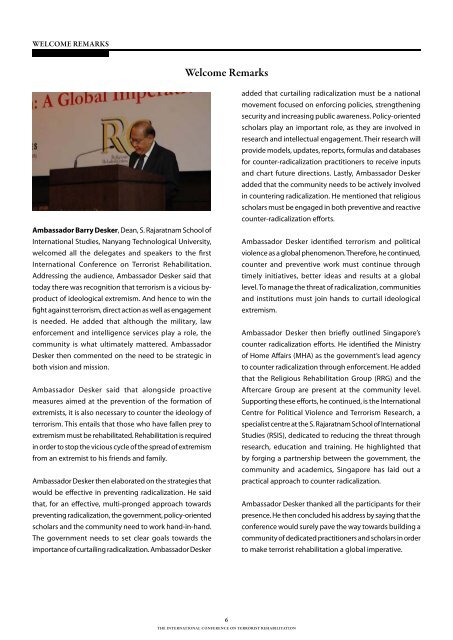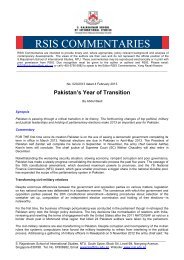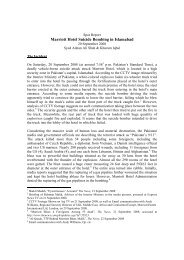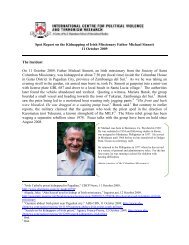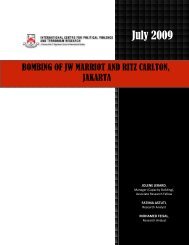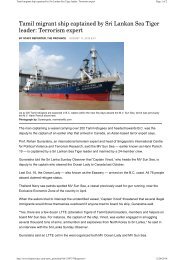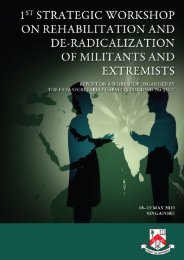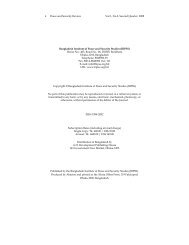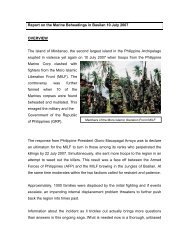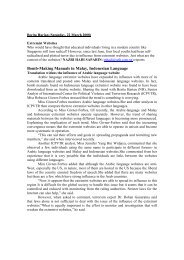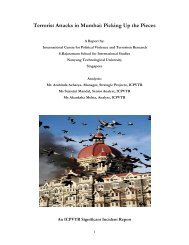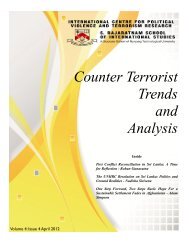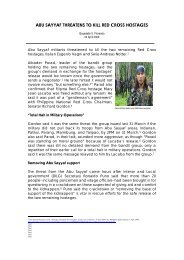International Conference On Terrorist Rehabilitation
International Conference On Terrorist Rehabilitation
International Conference On Terrorist Rehabilitation
Create successful ePaper yourself
Turn your PDF publications into a flip-book with our unique Google optimized e-Paper software.
WELCOME REMARKS<br />
Welcome Remarks<br />
Ambassador Barry Desker, Dean, S. Rajaratnam School of<br />
<strong>International</strong> Studies, Nanyang Technological University,<br />
welcomed all the delegates and speakers to the first<br />
<strong>International</strong> <strong>Conference</strong> on <strong>Terrorist</strong> <strong>Rehabilitation</strong>.<br />
Addressing the audience, Ambassador Desker said that<br />
today there was recognition that terrorism is a vicious byproduct<br />
of ideological extremism. And hence to win the<br />
fight against terrorism, direct action as well as engagement<br />
is needed. He added that although the military, law<br />
enforcement and intelligence services play a role, the<br />
community is what ultimately mattered. Ambassador<br />
Desker then commented on the need to be strategic in<br />
both vision and mission.<br />
Ambassador Desker said that alongside proactive<br />
measures aimed at the prevention of the formation of<br />
extremists, it is also necessary to counter the ideology of<br />
terrorism. This entails that those who have fallen prey to<br />
extremism must be rehabilitated. <strong>Rehabilitation</strong> is required<br />
in order to stop the vicious cycle of the spread of extremism<br />
from an extremist to his friends and family.<br />
Ambassador Desker then elaborated on the strategies that<br />
would be effective in preventing radicalization. He said<br />
that, for an effective, multi-pronged approach towards<br />
preventing radicalization, the government, policy-oriented<br />
scholars and the community need to work hand-in-hand.<br />
The government needs to set clear goals towards the<br />
importance of curtailing radicalization. Ambassador Desker<br />
added that curtailing radicalization must be a national<br />
movement focused on enforcing policies, strengthening<br />
security and increasing public awareness. Policy-oriented<br />
scholars play an important role, as they are involved in<br />
research and intellectual engagement. Their research will<br />
provide models, updates, reports, formulas and databases<br />
for counter-radicalization practitioners to receive inputs<br />
and chart future directions. Lastly, Ambassador Desker<br />
added that the community needs to be actively involved<br />
in countering radicalization. He mentioned that religious<br />
scholars must be engaged in both preventive and reactive<br />
counter-radicalization efforts.<br />
Ambassador Desker identified terrorism and political<br />
violence as a global phenomenon. Therefore, he continued,<br />
counter and preventive work must continue through<br />
timely initiatives, better ideas and results at a global<br />
level. To manage the threat of radicalization, communities<br />
and institutions must join hands to curtail ideological<br />
extremism.<br />
Ambassador Desker then briefly outlined Singapore’s<br />
counter radicalization efforts. He identified the Ministry<br />
of Home Affairs (MHA) as the government’s lead agency<br />
to counter radicalization through enforcement. He added<br />
that the Religious <strong>Rehabilitation</strong> Group (RRG) and the<br />
Aftercare Group are present at the community level.<br />
Supporting these efforts, he continued, is the <strong>International</strong><br />
Centre for Political Violence and Terrorism Research, a<br />
specialist centre at the S. Rajaratnam School of <strong>International</strong><br />
Studies (RSIS), dedicated to reducing the threat through<br />
research, education and training. He highlighted that<br />
by forging a partnership between the government, the<br />
community and academics, Singapore has laid out a<br />
practical approach to counter radicalization.<br />
Ambassador Desker thanked all the participants for their<br />
presence. He then concluded his address by saying that the<br />
conference would surely pave the way towards building a<br />
community of dedicated practitioners and scholars in order<br />
to make terrorist rehabilitation a global imperative.<br />
6<br />
THE INTERNATIONAL CONFERENCE ON TERRORIST REHABILITATION


